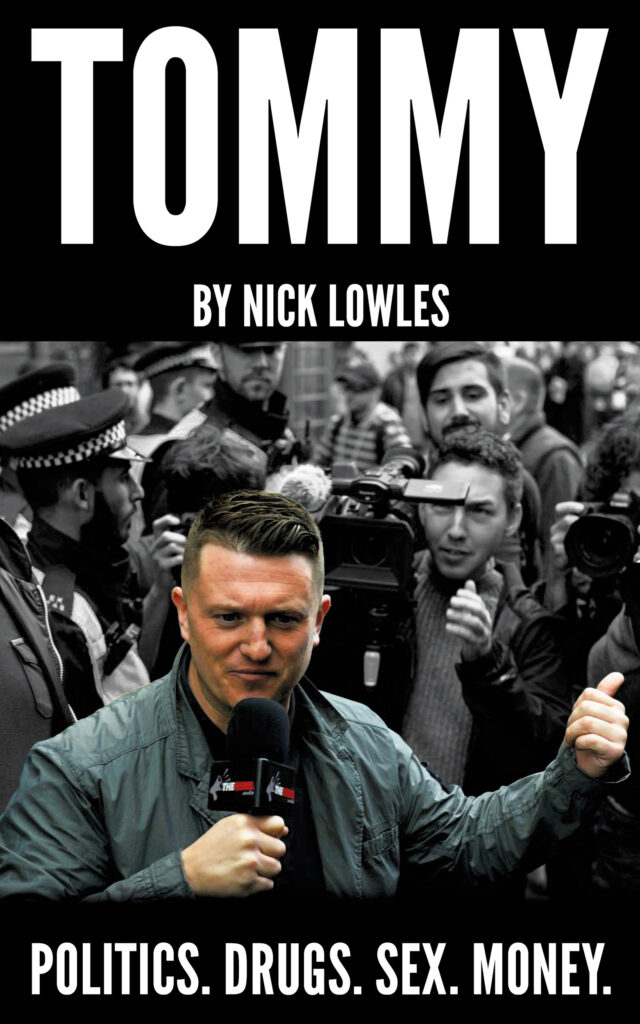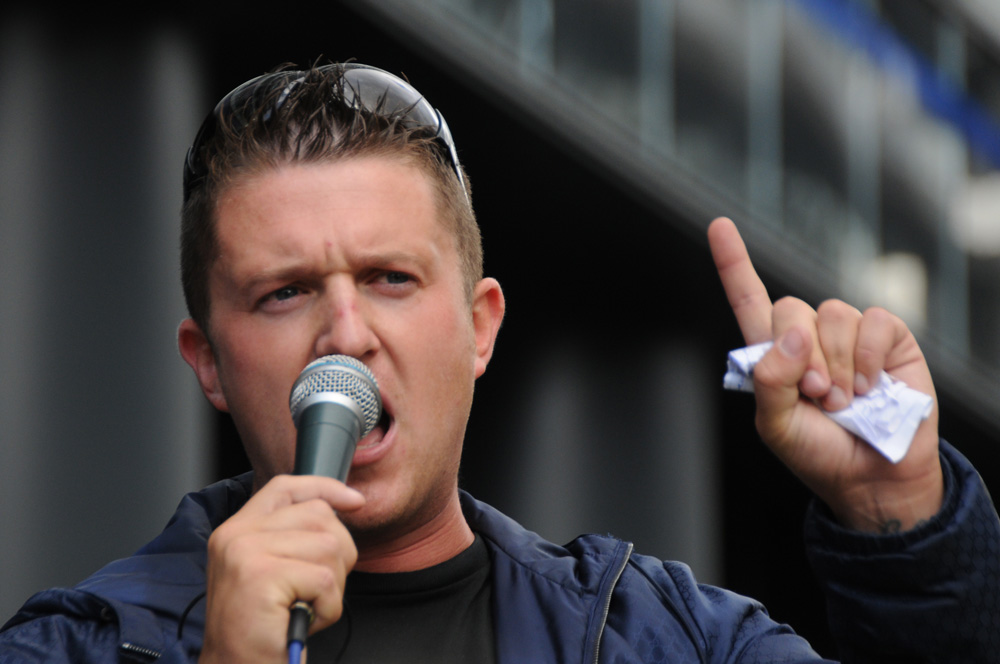
Prologue
10th March 2009
It was a beautiful spring morning. The two men made their way into Luton town centre. Despite it being a Tuesday in early March, crowds were already gathering in large numbers. They were there to show their respect for British troops who had just returned from a tour of duty overseas. Many lining the streets had relatives in the Royal Anglian Regiment. A few had lost loved ones.
A young local man, Stephen Lennon, strode purposefully ahead with his cousin, Kevin (“Kev”) Carroll. They were happy, perhaps even proud, for the regiment to be marching through their town. But the pair also had other things on their minds.
Over the previous days, rumours had begun circulating around Luton’s pubs and estates: Islamist extremists – zealots who wanted to bring about the overthrow of democracy and replace it with a strict Islamic caliphate – were going to hold a protest against the returning troops. The rumour mill began to run red hot as calls and texts were made with increasing urgency. Men drawn from across Luton’s football hooligan scene agreed to meet up at the parade.
It was Kev Carroll who first noticed the large number of police. They were clearly expecting trouble. He spotted several officers talking to Sayful Islam, one of Luton’s most prominent Islamist extremists. If he was there, reasoned Carroll, then other extremists were likely to be there too.
Over the other side of town, a Church of England community worker called Peter Adams received a call on his mobile.
“Do you realise how many people are down here?” his wife said to him, sounding agitated.
Adams had noted that there was an army parade through Luton, but had actually forgotten about it on the day.
“You’d better come down here Peter,” she told him in no uncertain terms. She went on to explain how some of the crowd were getting angry at the presence of a small group of extremists, who had clearly gathered to show their opposition to the soldiers.
Adams gathered up and placed his papers neatly aside before, in his own words, “belting into town”.
He arrived just as the soldiers were making their way through the centre. Moments before, the police had directed Sayful Islam and his handful of supporters through the town hall and to a pre-arranged gathering point along the parade’s route. There they stood, holding their “Butchers of Basra” and “Anglian soldiers go to hell” placards.
A few metres away was a group of about 20 Muslim women, all in burqas (full-length face and body coverings), holding separate, but identical, placards remonstrating against the troops.
Adams quickly tried to process what was happening. He caught up with the police cohesion officer, who he knew from his work inside the town’s troubled communities, and asked for an update.
“You’ll understand later, Peter. Trust me.”

Most locals were understandably furious about what they were witnessing. A solemn but respectful occasion was being overshadowed by a handful of individuals shouting abuse at those who had gone to fight for their country. Some people started to shout back, but they were kept away from the extremists by a thick cordon of police.
Just as quickly as Sayful Islam’s group was escorted into position, so too it was marched out again, back through the town hall and to a place outside the Arndale shopping centre where the Al-Muhajiroun extremists held a weekly stall.
Word quickly spread and it was not long before Stephen Lennon, one of the town’s leading football hooligans, and his cousin, a former boxer, had a tidy little group around them.
“Bin Laden’s mother is a whore!” screamed Kev Carroll.
One of Lennon’s friends popped into Marks & Spencer and bought several packs of bacon. Then he and others disappeared into the shopping centre only to re-appear a few minutes later at an upstairs window, directly above Sayful Islam’s group. They began to throw the rashers of bacon onto the Muslim protestors below.
Tempers were now running high. Lennon’s group had swelled to 200, many shouting and gesticulating at the group of 50 Islamist extremists pinned against the wall. Two lines of police had formed to separate the two groups. Unable to reach the protestors, Lennon and his fellow hooligans raged impotently. They were angry about Muslims (as they saw them) abusing British troops. Angry at the police for facilitating the protest. Angry at “Muslim extremism” which they believed was taking hold in the town. Several of the worst Islamist terror attacks and plots had a connection to the town.
While Lennon and others eventually moved away, plotting their revenge, one young man did take matters into his own hands. Kier McElroy was 18 at the time of the protest. Like Lennon, he was fuming at what had just happened. He had a cousin in the army and a family friend who had been killed in action. Watching Sayful Islam and his followers abuse the troops just got his blood boiling.
Walking away from the counter-protest, McElroy saw an Asian man walk across the town’s main square. But it wasn’t just an ordinary Asian man: it was Luton’s Mayor, all decked out in his robes and chain. This made McElroy even angrier. His pace quickened, and before long he broke into a run. As he approached the Mayor he shifted his body, enough to execute a flying kick on the innocent man.
Cllr Lakhbir Singh stumbled and fell forward, putting out his hands to break his fall. McElroy fled to escape pursuing police, though he was eventually identified by CCTV footage and prosecuted. It was only after his arrest that he learnt that the Mayor was in fact a Sikh, not a Muslim – a mistake that would be all too common, and costly, in the many years since 9/11.

A police officer sidled up to community worker Peter Adams as the situation was starting to calm down.
“What’s going on here, Peter?” he said, indicating with a nod towards the passing demonstrators and marchers.
“I reckon this is the next five years’ work,” Adams replied, with a grim tone. He later upgraded that to at least a decade.
Over the next few weeks tensions grew further. A spate of small-scale attacks culminated in a mosque being firebombed one night, allegedly by one of Stephen Lennon’s friends. Men on the estate where Lennon and others grew up began storing petrol bombs. A demonstration against Muslim extremism organised by Lennon led to an outbreak of violence, with shops and cars attacked in the area of town where many Muslims lived.
There were people around the country taking note of events in Luton with some interest. Contacts were soon made, meetings were arranged. What began as a local response to a very local incident mushroomed into a national movement. And then it went global, attracting violence, infamy – and lots of money.
***
TOMMY is the story of the young man who orchestrated the violent response to the events in Luton that day. Stephen Lennon, as he was on that March 2009 morning, would later become known to the world as “Tommy Robinson”. It is a name synonymous with violence, law breaking, money making, Islamophobia and brazen narcissism.
Short, stocky and fearless, Lennon began his journey into infamy as leader of Luton’s football hooligan gang, the “MIGs” – or “Men in Gear”. He had a following and respect among his peer group and a burning hatred of Islamist extremists – and some would say of Muslims more generally.
Within weeks of Sayful Islam’s protest in Luton, Lennon would help (with others) to set up the English Defence League. The EDL, as it was known, was to become Britain’s most prominent far-right street movement since the heyday of the National Front in the 1970s. And it would bring violence and misery in its wake, incurring more than £10 million in policing costs. Within a decade of founding the EDL, Lennon was operating on the world stage, lauded as a freedom fighter by the President of the United States’ son, as well as by the Russian Foreign Ministry.
Today Lennon’s alter ego “Tommy Robinson” is a household name. The name – perhaps we should say “brand” – is known by 55% of British adults, a recognition higher than for most frontline politicians. Lennon/Robinson is strongly liked by 6% of the population. At the height of his popularity in 2018, his videos were watched by millions and his livestreams were regularly viewed by over 30,000 people. Not bad for a working-class lad from Luton.
But there was also another side to Stephen Lennon. A side hidden from the public. And that was the businessman, criminal and mini-gangster. He has amassed a fortune worth millions of pounds, has multiple investments in property and businesses and if anyone dares gets in his way, well, they are bullied and threatened until they retreat in silence.
TOMMY is the explosive story of Stephen Lennon, Britain’s foremost far-right political activist and extremist.